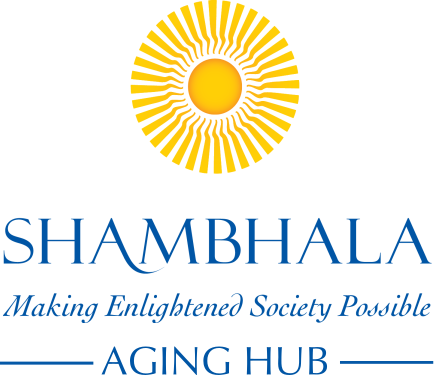by Victoria Howard, PhD.
My education in compassionate action began in my first meeting with Chögyam Trungpa Rinpoche in the summer of 1971. I did not know who he was or what he was. I was not interested in Buddhism particularly. I was curious about group living and wanted to see Tail of the Tiger, his community in Vermont. After touring the farm, our party was offered individual interviews with Rinpoche. I was directed to a small upstairs room where I found a young Tibetan man with long hair, wearing a turtleneck sweater and sitting on a cushion on the floor. His presence struck me profoundly. He did not do or say anything. He was just there, open to me. It was such a relief, like breathing fresh air for the first time. I began to cry and found myself speaking with surprising honesty. I told him that all of my life I had been in pain. Sometimes it seemed to be getting better and then it did not. He lifted his arm to me and with that gesture I saw that he understood my situation completely. “Trust yourself,” he said.
This encounter became the template for all of my learning about helping. Presence, openness and encouraging others to trust their own intelligence – Rinpoche had provided an example of how a human being could do this. But he was a Tibetan master, trained from childhood. I aspired to be like him and I did not see how that could be possible.
In 1974, my husband and I moved to Boulder, Colorado for the first summer of what was then Naropa Institute. Thus began my formal study of Buddhism and my practice of meditation. At the same time, I began helping frail old people in their homes. It felt like a privilege to enter each elder’s world. Family pictures, the 1934 World’s Fair ashtray, medicine bottles on a side table – everything told a story. I was struck by the way that these details mirrored the elder and revealed their character. As a mother of young children, this kind of work had been a practical choice as it had suited my schedule. Yet the intimacy of being with people in this way was profound. To my surprise, I found that my time on the meditation cushion and my time with my clients had the same quality. Both were about slowing down and paying attention. Both felt sweet, like a good thing to do. Meditation practice informed my care giving. I learned that I could come back again and again to the moment at hand, to my own good heart and to the vividness of the person in front of me.
At the same time, I began serving in Rinpoche’s household. My jobs were cooking and doing laundry. Rinpoche and his family lived in a large house on a beautiful, tree-lined street. Rinpoche’s Vajra Regent Ösel Tendzin and his wife and children lived there with them. Coming and going throughout the day were the many students who staffed the house. Filled to the brim, this residence provided the arena where we studied mindfulness and meditation in action. Ordinary domestic tasks were our curriculum. Chopping vegetables and folding towels, I learned about the interplay of mind and environment. I began to feel grounded in this awareness. My heart lifted with the knowledge that there actually is a sane way to be in the world.
Downstairs in Rinpoche’s house, there was a staff room where those of us who volunteered could leave our things while we were on duty. Hanging on the wall in that room was a slogan: “Service is the ultimate smile.” I had first realized this truth in my work with old people. In Rinpoche’s household, I came to understand service as practice. Out of this arose the inspiration to bring practice and livelihood together, to create a care organization to support elders in their homes. I first discussed this idea with the Regent and it was he that named it Dana, the Sanskrit word for Generosity, the first skillful action of the bodhisattva, giving without expectation of return. “If you can take care of us, you can take care of anyone,” he said. Ann Cason was my partner and co- director at Dana Home Care. Together we entered the homes of Ethel, Gladys, Jane, Hilliard, Gertrude and many other Boulder elders, each a unique jewel and each a teacher to us. With them we learned about helping relationships and the nature of devotion. We came to understand another slogan from Rinpoche’s house: “A Good Servant Makes a Good Master.” We do not put ourselves above those we help.
We lift from below.

